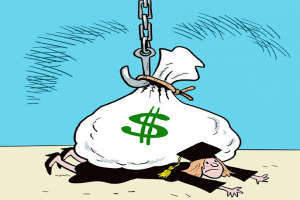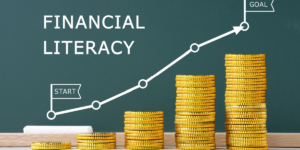Are you a college graduate with defaulted student loans? Our debt counselors want you to know that you’re far from alone. More than 1 million people default on their loans. That debt is now up to $1.75 trillion. According to the Federal Reserve, Thirty percent of all adults—representing over 4 in 10 people who went to college—said they incurred at least some debt for their education. This includes 20 percent of college attendees who still owed money and 22 percent who borrowed but fully repaid their education debts. So the likelihood of defaults is evidently becoming a growing crisis and one that deserves discussion. ACCC will go over why loans default, what problems they cause, and how to fix them. Let’s get started!
How Would I Default on My Student Loans
For many people with student loans, paying a lot of money every month is the reality. Right now, people are paying an average of $503a month, which can be really hard if you’re just getting by.
But if you start missing your loan payments, you risk your loans going into default, and that can cause big problems.
When you miss a payment on your federal student loans, that’s when the process of going into default starts. Here are the three steps that lead to defaulting:
- The first day after you miss a payment: Your federal student loans are considered delinquent and you may be charged late fees.
- After 90 days or more of not making a payment: Your loan servicer reports the delinquent account to the three main credit bureaus, which means it appears on your credit report and can hurt your credit score.
- After 270 days, or roughly nine months, of past-due payments: Your federal loan goes into default and you could see your debt go to collections.
Why Do Loans Default?
Defaulted student loans are loans that go 270 days or more without full payment. This is beyond delinquency, which only requires one missed full payment. Much like credit card delinquency, this is reported to the credit bureaus and hurts your credit score. Your loans, after nine months, will usually go to a collection agency.
Loans in default can severely impact various aspects of your life and finances. Here’s what you should be aware of:
What Happens If You Default On Your Federal Student Loans
The Federal student aid website details what consequences you may be face with in case of Federal Student Loan Default. Defaulting can impact your overall financial journey.
The entire unpaid balance of your loan and any interest you owe becomes immediately due (this is called “acceleration”).
You can no longer receive deferment or forbearance, and you lose eligibility for other benefits, such as the ability to choose a repayment plan.
You lose eligibility for additional federal student aid.
The default is reported to credit bureaus, damaging your credit rating and affecting your ability to buy a car or house or to get a credit card.
It may take years to reestablish a good credit record.
You may not be able to purchase or sell assets such as real estate.
Your tax refunds and federal benefit payments may be withheld and applied toward repayment of your defaulted loan (this is called “Treasury offset”).
Your wages may be garnished. This means your employer may be required to withhold a portion of your pay and send it to your loan holder to repay your defaulted loan.
Your loan holder can take you to court.
You may be charged court costs, collection fees, attorney’s fees, and other costs associated with the collection process.
If your school withholds your official transcript, upon your request the school must provide you with an unofficial transcript that might be accepted by another institution.
What If My Private Student Loans Default?
The consequences of defaulting on private loans defer from lender to lender. Therefore, understanding the terms of your loan is crucial if you are faced with a difficulty to repay your loan as you initially planned. Get in touch with their customer representatives to explore your options before the situation worsens. Your late or missed payments may be reported to the credit bureaus impacting your credit rating. Also, collections agencies may be involved to collect unpaid debts. Therefore, it is important that you speak with your lender to make any possible arrangements to avoid serious consequences.
What If I am At Risk of Defaulting on My Student Loans?
Every solution to your problems start with a conversation. Talk to your loan service providers sooner than later to explore your options. You may be eligible to switch to a Income-driven repayment plan where your payments are more feasible with what you make. A Consolidation loan or opting for deferment or forbearance are your other choices. However, refinancing through a private lender to settle federal loans are not really advised because you may lose the federal loan protections you typically get.
How to Fix Defaulted Student Loans?
At this point, what can be done to fix a bad student loan? First, you can pay as much towards the loan as you can. Since you can’t declare bankruptcy on them, you will have to pay one way or another. There are programs that would allow you to pay a certain amount each month, and get the loan back in good standing. These “rehab” programs would start back at square one should one payment be missed. Another option is just paying the loan off in full. It’s difficult if your economic situation hasn’t improved, but it’s doable. Start by budgeting to cover your major expenses and needs first, then see what you have leftover for the month. Whatever extra money you have, put that towards your loans, if you aren’t saving it.
Conclusion
Student loans cause trouble once they are in default. There are multiple problems that come from it. It’s important to pay them on time, all the time. If you do fall behind, don’t despair. It’s never too late to turn your situation around; if you got into debt, you can get out of it too!
If you are looking for student loan services, speak with a certified counselor at ACCC today. Schedule a free credit counseling session.







